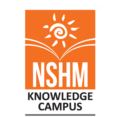Institutional Distinctiveness
NSHM Knowledge Campus provides every opportunity to its Faculty Members, non-teaching staff and students for an ethical and moral value-based self-development to meet the challenges of the dynamic teaching learning environment. This is vital for the growth and advancement of the institution.
In line with the NEP 2020 objectives, the Institute is consistent in its commitment to enhance the quality of its faculty, catalyse high standard academic research in discipline specific and interdisciplinary fields, build effective governance and leadership and provide an optimal learning environment and support system for the students. The Institute has a collaborative and interactive work culture.
One of the significant aspects has been the development of state-of-the-art ICT infrastructure in the
Institute that is easily accessible to Faculty Members, non-teaching staff and students.
The Institute periodically organises training programmes in the latest ICT applications and tools in higher education. In the past five years, the practice of capacity building has been strengthened in multiple dimensions.
For teaching staff
- The Institute encourages young and newly recruited faculty to participate in FOPs and enhances skill development of Faculty Members through FDPs/Refresher Courses/Workshop. The Faculty Members are financially and administratively supported.
- Workshops and hands-on training for skill development of Faculty Members focuses on preparing for classroom (offline/online) lectures, accessing Open Educational Resources (OERs), using Creative Common License (CCL) and google applications, creating MOOCs and video resources through Open Broadcaster Software (OBS) and other meaningful teacher-student engagement.
- In the context of Covid-19, all teaching learning was shifted to the MS Teams platform. A group of expert Faculty Members were given the responsibility to train and guide the faculty to ensure smooth transition.
- The IQAC has instituted research grants, awards and incentives in various categories to recognize substantial research contributions, thereby motivating the faculty to undertake doctoral and postdoctoral studies, quality academic research and publication in reputed and accredited journals. Many faculty members have published in NASA ADS, SCOPUS or Web of Science accredited journals in the past year and half. Faculty Members have also published in books and contributed chapters in books.
- The Faculty Members have taken up minor and major research projects, funded by several funding organizations.
- The Institute values the long-term physical and emotional well-being of its Faculty Members in order to support their teaching-learning, research and organisational roles and responsibilities.
- The HR Department constantly organizes programs to motivate and encourage faculty members and staffs. All leading festivals are celebrated in a grand way in the institution.
- The Institute extends administrative support for faculty to engage in curriculum development, content creation, question paper setting and evaluation.
For non-teaching staff
- Basic and advanced ICT workshops have been organised to increase efficiency in work outcomes.
- Administrative and accounts related workshops for non-teaching staff have been held for updating knowledge and skills.
- FDPs for library professionals have been organised, including training sessions on KOHA.
- Non-teaching staff organise regular talks and seminars and attend programmes in other Institutes/universities.
- Non – teaching staff has been provided training in the application of latest media software and use of equipment to produce high quality media resources.
- The IQAC has instituted an award for innovative administrative reform, which has been initiated and practiced.
- Non-teaching staff are involved in supporting faculty in organising TLC programmes, which has enhanced their work spectrum. The IQAC periodically facilitates academic and administrative audits. Department-wise post-audit review meetings are conducted, which allows the teacher and non-teaching staff to introspect and channelize their strengths to acquire more skills and expertise, pivotal to their promotions.
For students
- Compulsory personality development course has been introduced for students of all disciplines to groom and make them industry-ready.
- Executive Certificate Programmes for students, supporting the curriculum and bridge courses for advanced studies, are regularly organised.
- International student exchange program and international certification program has been organised to increase the outlook of the students.
- ICT and Research Tools and software Certificate Courses have been specially designed for the students.
- Students are encouraged to organise a wide range of activities under the umbrella of departmental and other academic societies/cells to hone organizational skills and learn beyond the classroom.
- Special training courses are offered to prepare the students to face competitive exams and entrance tests.
- All students are given training and placement support. Placements department has been pioneer in bringing leading companies for campus placement. The packages received by the students have been highly competitive.
- Special Lectures are given by Professors of Practice (POP) who has several years of Industry experience.
- Out of the box thinking is encouraged by NSHM Knowledge Campus so that the students can stand outside the crowd. In this endeavour NSHM Astronomy Club by the name NSHM Astronomy & Cosmology Club was established which encourages students to have a basic knowledge of astronomy. With the vision of Ministry of Education to encourage students enhance their knowledge about Indian lunar mission Chandrayaan 3 a quiz was conducted by NSHM Astronomy Club.An observatory centre is also established in NSHM Knowledge Campus having an Dobsonian Telescope.
- The institute in the ideology of Fit India Movement celebrates one week of fitness activities in the month of November. Apart from that yearly sports week is celebrated for both students and faculty members.
